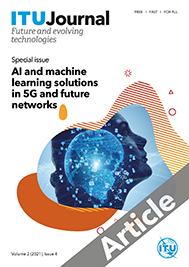|
Site-specific millimeter-wave compressive channel estimation algorithms with hybrid MIMO architectures
|
Authors: Sai Subramanyam Thoota, Dolores Garcia Marti, Özlem Tugfe Demir, Rakesh Mundlamuri, Joan Palacios, Cenk M. Yetis, Christo Kurisummoottil Thomas, Sameera H. Bharadwaja, Emil Björnson, Pontus Giselsson, Marios Kountouris, Chandra R. Murthy, Nuria González-Prelcic, Joerg Widmer
Status: Final
Date of publication: 14 July 2021
Published in: ITU Journal on Future and Evolving Technologies, Volume 2 (2021), Issue 4 - AI and machine learning solutions in 5G and future networks, Pages 9-26
Article DOI : https://doi.org/10.52953/OEEG5719
|
 | Abstract:
In this paper, we present and compare three novel model-cum-data-driven channel estimation procedures in a millimeter-wave Multi-Input Multi-Output (MIMO) Orthogonal Frequency Division Multiplexing (OFDM) wireless communication system. The transceivers employ a hybrid analog-digital architecture. We adapt techniques from a wide range of signal processing methods, such as detection and estimation theories, compressed sensing, and Bayesian inference, to learn the unknown virtual beamspace domain dictionary, as well as the delay-and-beamspace sparse channel. We train the model-based algorithms with a site-specific training dataset generated using a realistic ray tracing-based wireless channel simulation tool. We assess the performance of the proposed channel estimation algorithms with the same site's test data. We benchmark the performance of our novel procedures in terms of normalized mean squared error against an existing fast greedy method and empirically show that model-based approaches combined with data-driven customization unanimously outperform the state-of-the-art techniques by a large margin. The proposed algorithms were selected as the top three solutions in the "ML5G-PHY Channel Estimation Global Challenge 2020" organized by the International Telecommunication Union. |
|
Keywords: Bayesian inference, channel estimation, compressed sensing, data-driven, hybrid MIMO, mmWave
Rights: © International Telecommunication Union, available under the CC BY-NC-ND 3.0 IGO license.
|
|
|
|
| |